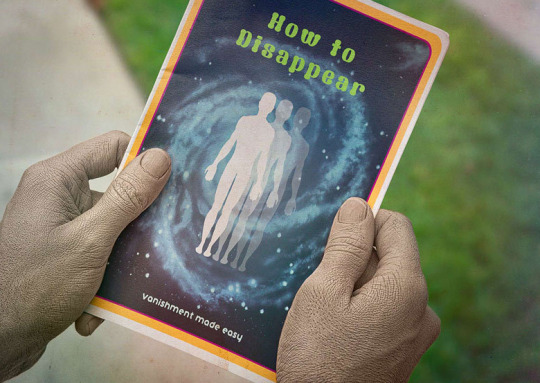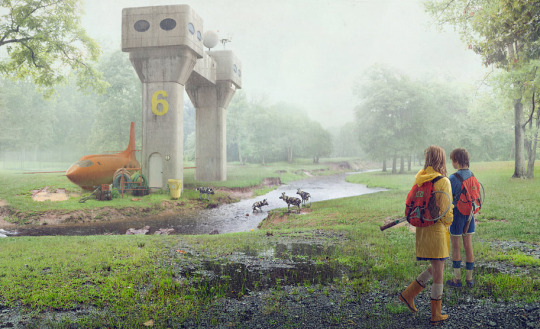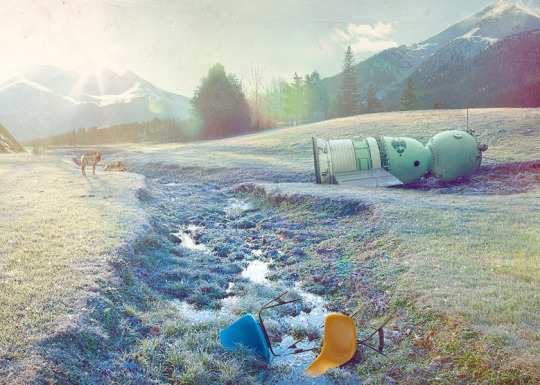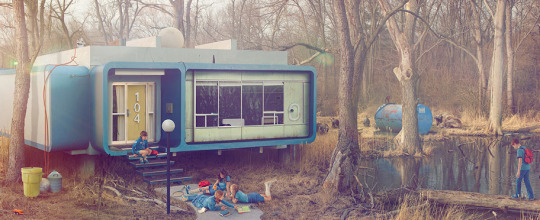Eliza is fond of winter clothes, kids' watches, and popcorn-flavoured jelly beans. She resides in Barcelona but lives in her own head, mostly, where she likes to drive herself crazy with worry and have long, heartbreaking talks with one Seymour Glass. She overthinks things and is easily impressed.
Don't wanna be here? Send us removal request.
Text
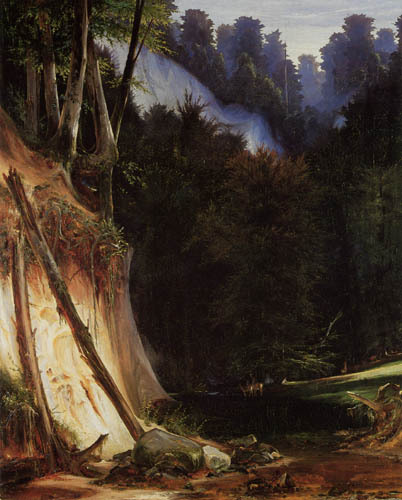
Farther up the gorge the sea's voice fainted and ceased. We heard a new noise far away ahead of us, vague and metallic, it might have been some unpleasant bird's voice Bedded in a matrix of long silences. At length we came to a little cabin lost in the redwoods, An old man sat on a bench before the doorway filing a cross-cut saw; sometimes he slept, Sometimes he filed. Two or three horses in the corral by the streamside lifted their heads To watch us pass, but the old man did not. In the afternoon we returned the same way, And had the picture in our minds of magnificent regions of space and mountain not seen before. (This was The first time that we visited Pigeon Gap, whence you look down behind the great shouldering pyramid- Edges of Pico Blanco through eagle-gulfs of air to a forest basin Where two-hundred-foot redwoods look like the pile on a Turkish carpet.) With such extensions of the idol- Worshipping mind we came down the streamside. The old man was still at his post by the cabin doorway, but now Stood up and stared, said angrily "Where are you camping?" I said "We're not camping, we're going home." He said From his flushed heavy face, "That's the way fires get started. Did you come at night?" "We passed you this morning. You were half asleep, filing a saw." "I'll kill anybody that starts a fire here . . ." his voice quavered Into bewilderment ... "I didn't see you. Kind of feeble I guess. My temperature's a hundred and two every afternoon." "Why, what's the matter?" He removed his hat And rather proudly showed us a deep healed trench in the bald skull. "My horse fell at the ford, I must ‘a’ cracked my head on a rock. Well, sir, I can't remember anything till next morning. I woke in bed the pillow was soaked with blood, the horse was in the corral and had had his hay," Singing the words as if he had told the story a hundred times. To whom? To himself, probably, "The saddle was on the rack and the bridle on the right nail. What do you think of that now?" He passed His hand on his bewildered forehead and said, "Unless an angel or something came down and did it. A basin of blood and water by the crick, I must 'a' washed myself." My wife said sharply, "Have you been to a doctor?" "Oh yes," he said, "my boy happened down." She said "You oughtn't to be alone here: are you all alone here?" "No," he answered, "horses. I've been all over the world: right here is the most beautiful place in the world. I played the piccolo in ships' orchestras." We looked at the immense redwoods and dark Fern-taken slip of land by the creek, where the horses were, and the yuccaed hillsides high in the sun Flaring like torches; I said "Darkness comes early here." He answered with pride and joy, "Two hundred and eighty- Five days in the year the sun never gets in here. Like living under the sea, green all summer, beautiful." My wife said, "How do you know your temperature's A hundred and two?" "Eh? The doctor. He said the bone Presses my brain, he's got to cut out a piece. I said 'All right, you've got to wait till it rains, I've got to guard my place through the fire-season.' By God," he said joyously, "The quail on my roof wake me up every morning, then I look out the window and a dozen deer Drift up the canyon with the mist on their shoulders. Look in the dust at your feet, all the little hoofprints,"
-Robinson Jeffers, All The Little Hoofprints
3 notes
·
View notes
Text
Philip Larkin - Church Going
Once I am sure there's nothing going on I step inside, letting the door thud shut. Another church: matting, seats, and stone, And little books; sprawlings of flowers, cut For Sunday, brownish now; some brass and stuff Up at the holy end; the small neat organ; And a tense, musty, unignorable silence, Brewed God knows how long. Hatless, I take off My cycle-clips in awkward reverence. Move forward, run my hand around the font. From where I stand, the roof looks almost new - Cleaned, or restored? Someone would know: I don't. Mounting the lectern, I peruse a few Hectoring large-scale verses, and pronounce 'Here endeth' much more loudly than I'd meant. The echoes snigger briefly. Back at the door I sign the book, donate an Irish sixpence, Reflect the place was not worth stopping for. Yet stop I did: in fact I often do, And always end much at a loss like this, Wondering what to look for; wondering, too, When churches will fall completely out of use What we shall turn them into, if we shall keep A few cathedrals chronically on show, Their parchment, plate and pyx in locked cases, And let the rest rent-free to rain and sheep. Shall we avoid them as unlucky places? Or, after dark, will dubious women come To make their children touch a particular stone; Pick simples for a cancer; or on some Advised night see walking a dead one? Power of some sort will go on In games, in riddles, seemingly at random; But superstition, like belief, must die, And what remains when disbelief has gone? Grass, weedy pavement, brambles, buttress, sky, A shape less recognisable each week, A purpose more obscure. I wonder who Will be the last, the very last, to seek This place for what it was; one of the crew That tap and jot and know what rood-lofts were? Some ruin-bibber, randy for antique, Or Christmas-addict, counting on a whiff Of gown-and-bands and organ-pipes and myrrh? Or will he be my representative, Bored, uninformed, knowing the ghostly silt Dispersed, yet tending to this cross of ground Through suburb scrub because it held unspilt So long and equably what since is found Only in separation - marriage, and birth, And death, and thoughts of these - for which was built This special shell? For, though I've no idea What this accoutred frowsty barn is worth, It pleases me to stand in silence here; A serious house on serious earth it is, In whose blent air all our compulsions meet, Are recognized, and robed as destinies. And that much never can be obsolete, Since someone will forever be surprising A hunger in himself to be more serious, And gravitating with it to this ground, Which, he once heard, was proper to grow wise in, If only that so many dead lie round.
2 notes
·
View notes
Text
The Whole Story
How it should happen this way I am not sure, but you Are sitting next to me, Minding your own business When all of a sudden I see A fire out the window.
I nudge you and say, “That’s a fire. And what’s more, We can’t do anything about it, Because we’re on this train, see?” You give me an odd look As though I had said too much.
But for all you know I may Have a passion for fires, And travel by train to keep From having to put them out. It may be that trains Can kindle a love of fire.
I might even suspect That you are a fireman In disguise. And then again I might be wrong. Maybe You are the one Who loves a good fire. Who knows?
Perhaps you are elsewhere, Deciding that with no place To go you should not Take a train. And I, Seeing my own face in the window, May have lied about the fire.
[Mark Strand - The Whole Story]
5 notes
·
View notes
Quote
They say I am not right when I say that what you say is not the same as what you write but anybody try to write and they will say that this is so. When you write well when you write anybody try to write and they will say that I am right. What you say has nothing to do with what you write. Does it rain in America oh yes and there is snow. High up and low down there is snow, snow snow really beautiful snow.
Gertrude Stein
1 note
·
View note
Audio
0 notes
Quote
Hello, babies. Welcome to Earth. It's hot in the summer and cold in the winter. It's round and wet and crowded. At the outside, babies, you've got about a hundred years here. There's only one rule that I know of, babies—God damn it, you've got to be kind.
- Kurt Vonnegut
20 notes
·
View notes
Photo

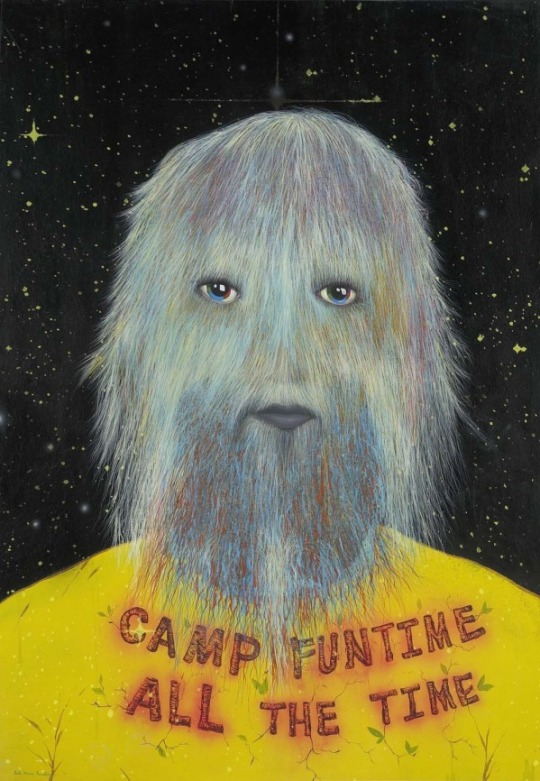
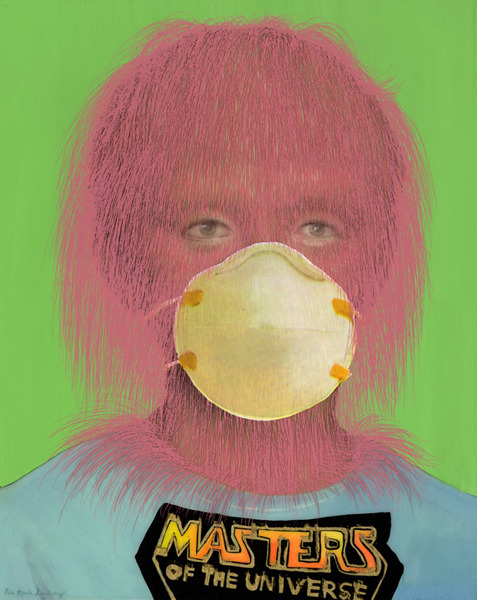


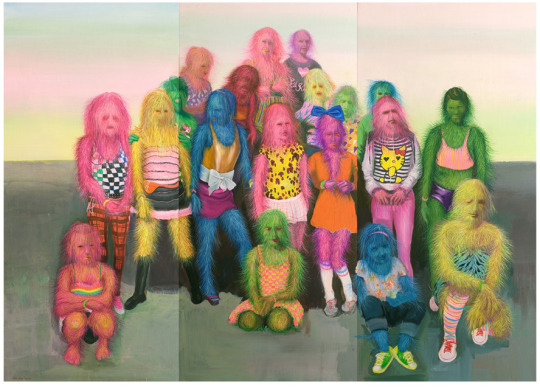
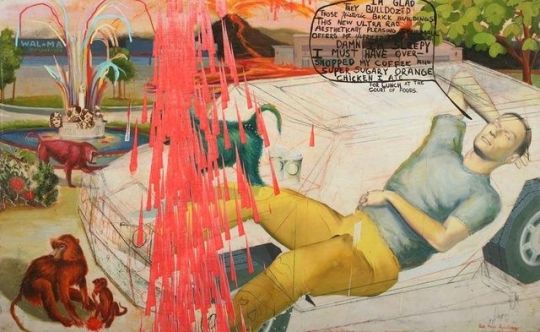
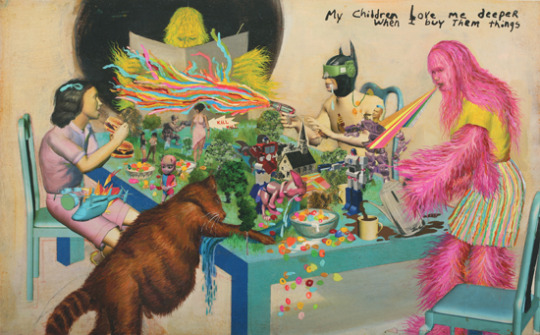
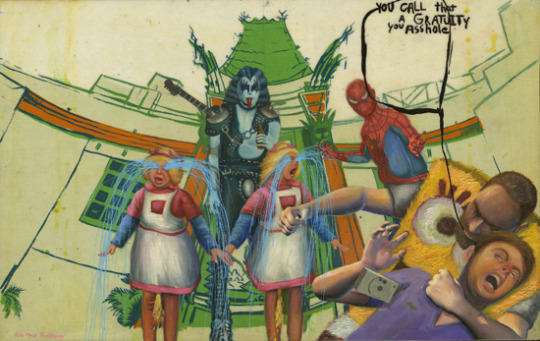
Erik Sandberg
1 note
·
View note
Link
Why, despite our technological capacities, are we not all working three- to four-hour days? asks David Graeber.
3 notes
·
View notes
Audio
2 notes
·
View notes
Text
You want to know what I really learned? I learned that people don’t consider time alone as part of their life. Being alone is just a stretch of isolation they want to escape from. I saw a lot of wine-drinking, a lot of compulsive drug use, a lot of sleeping with the television on. It was less festive than I anticipated. My view had always been that I was my most alive when I was totally alone, because that was the only time I could live without fear of how my actions were being scrutinized and interpreted. What I came to realize is that people need their actions to be scrutinized and interpreted in order to feel like what they’re doing matters. Singular, solitary moments are like television pilots that never get aired. They don’t count. This, I think, explains the fundamental urge to get married and have kids[...]. We’re self-conditioned to require an audience, even if we’re not doing anything valuable or interesting. I’m sure this started in the 1970s. I know it did. I think Americans started raising offspring with this implicit notion that they had to tell their children, “You’re amazing, you can do anything you want, you’re a special person.” But—when you really think about it—that emotional support only applies to the experience of living in public. We don’t have ways to quantify ideas like “amazing” or “successful” or “lovable” without the feedback of an audience. Nobody sits by himself in an empty room and thinks, “I’m amazing.” It’s impossible to imagine how that would work. But being “amazing” is supposed to be what life is about. As a result, the windows of time people spend by themselves become these meaningless experiences that don’t really count. It’s filler.
- "The Visible Man", Chuck Klosterman
8 notes
·
View notes
Photo
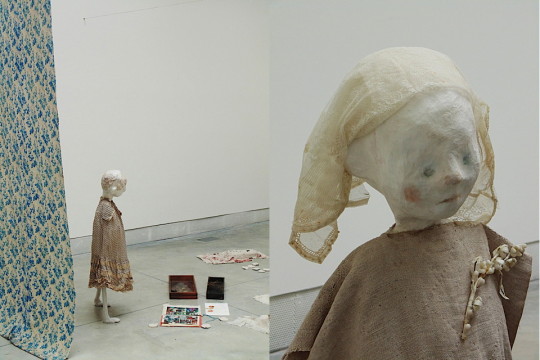
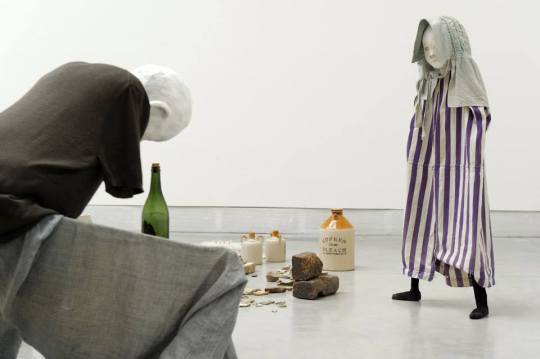
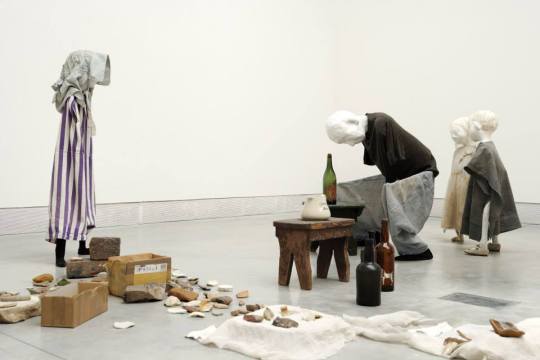
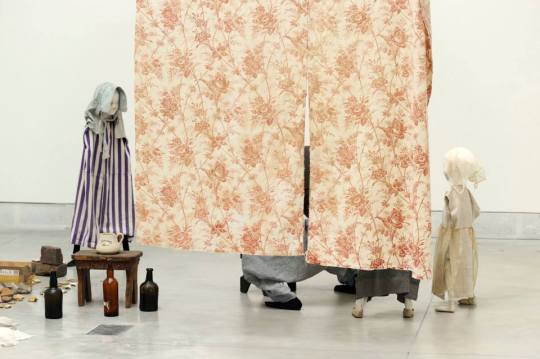
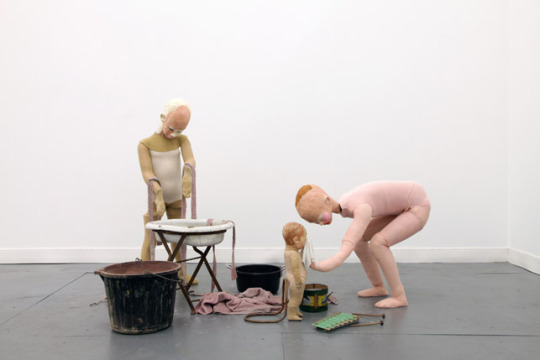
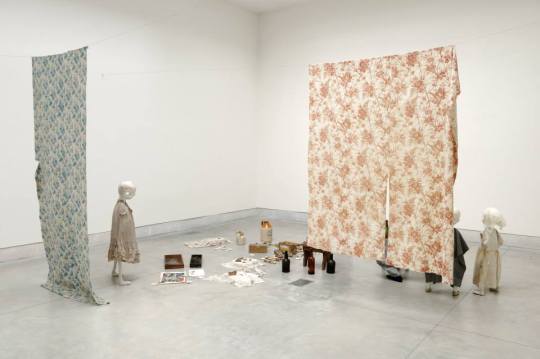
installation by Cathy Wilkes
2 notes
·
View notes
Quote
There are certain people who do not feel like they were raised by wolves, and they are the ones who make the world tick. They are the ones who keep everything functioning so the rest of us can worry about what sort of person we should be.
- Sheila Heti
4 notes
·
View notes
Photo
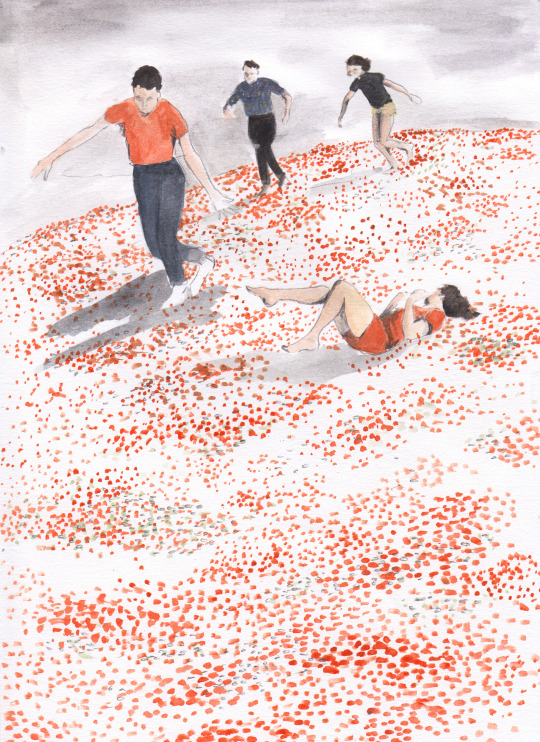
15 notes
·
View notes
Text
Manifesto
"Last Thursday, my organization, People Reluctant To Kill for an Abstraction, orchestrated an overwhelming show of force around the globe.
At precisely 9 in the morning, working with focus and stealth, our entire membership succeeded in simultaneously beheading no one. At 10, Phase II began, during which our entire membership did not force a single man to suck another man's penis. Also, none of us blew himself/herself up in a crowded public place. No civilians were literally turned inside out via our powerful explosives. In addition, at 11, in Phase III, zero (0) planes were flown into buildings.
During Phase IV, just after lunch, we were able to avoid bulldozing a single home. Furthermore, we set, on roads in every city, in every nation in the world, a total of zero (0) roadside bombs which, not being there, did not subsequently explode, killing/maiming a total of nobody. No bombs were dropped, during the lazy afternoon hours, on crowded civilian neighborhoods, from which, it was observed, no post-bomb momentary silences were then heard. These silences were, in all cases, followed by no unimaginable, grief-stricken bellows of rage, and/or frantic imprecations to a deity. No sleeping baby was awakened from an afternoon nap by the sudden collapse and/or bursting into flame of his/her domicile during Phase IV.
In the late afternoon (Phase V), our membership focused on using zero (0) trained dogs to bite/terrorize naked prisoners. In addition, no stun guns, rubber batons, rubber bullets, tear gas, or bullets were used, by our membership, on any individual, anywhere in the world. No one was forced to don a hood. No teeth were pulled in darkened rooms. No drills were used on human flesh, nor were whips or flames. No one was reduced to hysterical tears via a series of blows to the head or body, by us. Our membership, while casting no racial or ethnic aspersions, skillfully continued not to rape, gang-rape, or sexually assault a single person. On the contrary, during this late-afternoon phase, many of our membership flirted happily and even consoled, in a nonsexual way, individuals to whom they were attracted, putting aside their sexual feelings out of a sudden welling of empathy.
As night fell, our membership harbored no secret feelings of rage or, if they did, meditated, or discussed these feelings with a friend until such time as the feelings abated, or were understood to be symptomatic of some deeper sadness.
It should be noted that, in addition to the above-listed and planned activities completed by our members, a number of unplanned activities were completed by part-time members, or even nonmembers.
In London, a bitter homophobic grandfather whose grocery bag broke open gave a loaf of very nice bread to a balding gay man who stopped to help him. A stooped toothless woman in Tokyo pounded her head with her hands, tired beyond belief of her lifelong feelings of anger and negativity, and silently prayed that her heart would somehow be opened before it was too late. In Syracuse, New York, holding the broken body of his kitten, a man felt a sudden kinship for all small things.
Even declared nonmembers, it would appear, responded to our efforts. In Chitral, Pakistan, for example, a recent al-Qaida recruit remembered the way an elderly American tourist once made an encouraging remark about his English, and how, as she made the remark, she touched his arm, like a mother. In Gaza, an Israeli soldier and a young Palestinian, just before averting their eyes and muttering insults in their respective languages, exchanged a brief look of mutual shame.
Who are we? A word about our membership.
Since the world began, we have gone about our work quietly, resisting the urge to generalize, valuing the individual over the group, the actual over the conceptual, the inherent sweetness of the present moment over the theoretically peaceful future to be obtained via murder. Many of us have trouble sleeping and lie awake at night, worrying about something catastrophic befalling someone we love. We rise in the morning with no plans to convert anyone via beating, humiliation, or invasion. To tell the truth, we are tired. We work. We would just like some peace and quiet. When wrong, we think about it awhile, then apologize. We stand under awnings during urban thunderstorms, moved to thoughtfulness by the troubled, umbrella-tinged faces rushing by. In moments of crisis, we pat one another awkwardly on the back, mumbling shy truisms. Rushing to an appointment, remembering a friend who has passed away, our eyes well with tears and we think: Well, my God, he could be a pain, but still I'm lucky to have known him.
This is PRKA. To those who would oppose us, I would simply say: We are many. We are worldwide. We, in fact, outnumber you. Though you are louder, though you create a momentary ripple on the water of life, we will endure, and prevail.
Join us.
Resistance is futile."
- George Saunders
#george saunders#saunders#manifesto#slate#prka#non-fiction#press#media#compassion#news#politics#literature#longform
5 notes
·
View notes
Audio
This is as close to a perfect, understated short story as you're likely to get in terms of song lyrics. It feels very Salingeresque* in the way the whole emotional punch is delivered in the last line of the story/song:
The clasp broke at the disco, Mom, I'm sorry and the older men who hit on Becky nearly broke their necks on scattered pearls And we searched the best we could for two entire songs we knelt and felt along the place where we had stood But we only found 7 of Grandmother's pearls. And as we rode the bus home I thought, surely, I'd wake up tomorrow just to find that I had dreamed up everything there'd still be pearls on a string I wouldn't smell like smoke and I'd still have the cash that I had spent on drinks Oh, I feel as scattered as Grandmother's pearls.
Mom, don't cry—they're only pearls.
*It reminds me especially of "Just Before the War with the Eskimos", where another everyday object, this time a sandwich, is invested with a whole lot of emotional weight.
#literature#music#casiotone for the painfully alone#lyrics#song lyrics#salinger#j.d. salinger#nine stories#indie pop#electropop#casiotone
138 notes
·
View notes
Text
These points have been made before, but sometimes we need reminding:
Do the constellation of thinkers from South Asia, exemplified by leading figures like Ashis Nandy, Partha Chatterjee, Gayatri Spivak, Ranajit Guha, Sudipta Kaviraj, Dipesh Chakrabarty, Homi Bhabha, or Akeel Bilgrami, come together to form a nucleus of thinking that is conscious of itself? [...] Are they "South Asian thinkers" or "thinkers", the way these European thinkers are? Why is it that if Mozart sneezes it is "music" (and I am quite sure the great genius even sneezed melodiously) but the most sophisticated Indian music ragas are the subject of "ethnomusicology"?
Is that "ethnos" not also applicable to the philosophical thinking that Indian philosophers practice - so much so that their thinking is more the subject of Western European and North American anthropological fieldwork and investigation?
We can turn around and look at Africa. What about thinkers like Henry Odera Oruka, Ngugi wa Thiong'o, Wole Soyinka, Chinua Achebe, Okot p'Bitek, Taban Lo Liyong, Achille Mbembe, Emmanuel Chukwudi Eze, Souleymane Bachir Diagne, V.Y. Mudimbe: Would they qualify for the term "philosopher" or "public intellectuals" perhaps, or is that also "ethnophilosophy"?
Why is European philosophy "philosophy", but African philosophy ethnophilosophy, the way Indian music is ethnomusic? [This is] an ethnographic logic that is based on the very same reasoning that if you were to go to the New York Museum of Natural History, you only see animals and non-white peoples and their cultures featured inside glass cages, but no cage is in sight for white people and their cultures - they just get to stroll through the isles and enjoy the power and ability of looking at taxidermic Yaks, cave dwellers, elephants, Eskimos, buffalo, Native Americans, etc, all in a single winding row.
[...]
The question of Eurocentricism is now entirely blase. Of course Europeans are Eurocentric and see the world from their vantage point, and why should they not? They are the inheritors of multiple (now defunct) empires and they still carry within them the phantom hubris of those empires and they think their particular philosophy is "philosophy" and their particular thinking is "thinking", and everything else is - as the great European philosopher Immanuel Levinas was wont of saying - "dancing".
The question is rather the manner in which non-European thinking can reach self-consciousness and evident universality, not at the cost of whatever European philosophers may think of themselves for the world at large, but for the purpose of offering alternative (complementary or contradictory) visions of reality more rooted in the lived experiences of people in Africa, in Asia, in Latin America - counties and climes once under the spell of the thing that calls itself "the West" but happily no more.
#philosophy#intellectualism#intellectuals#al jazeera#asia#africa#thinkers#europe#eurocentrism#politics#culture#postcolonialism#anthropology#longform
2 notes
·
View notes

